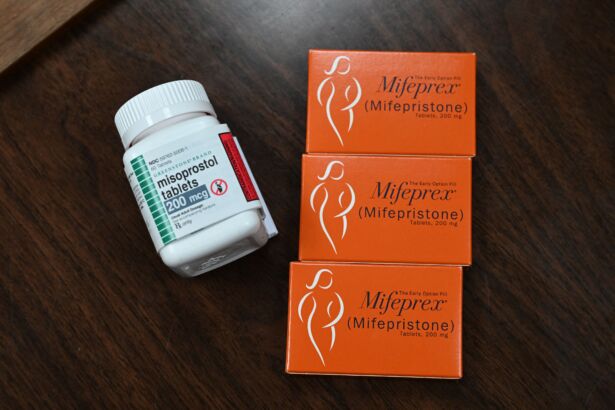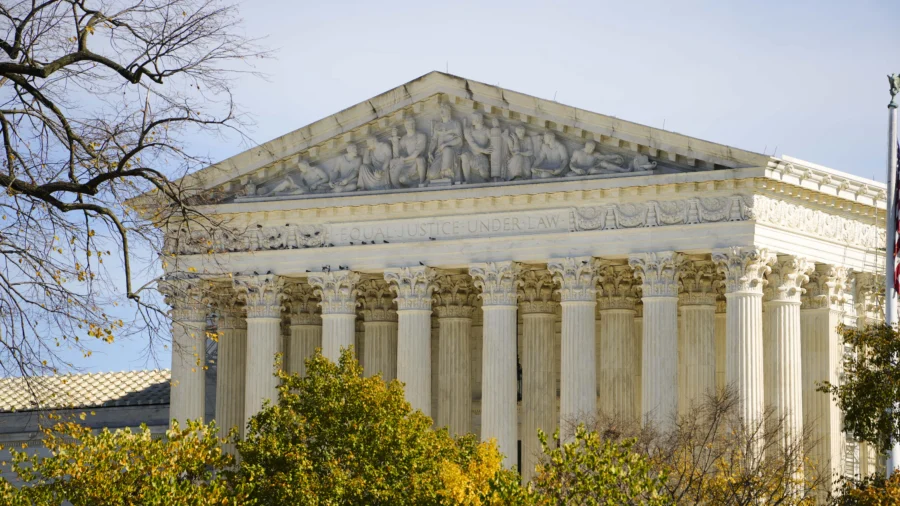The Supreme Court failed on Dec. 11 to take up or reject a much-anticipated, heavily-litigated challenge to the government’s decision in 2000 to approve mifepristone, a pill used for abortions, putting off the court’s decision for the time being.
Although a lower court had blocked the sale of mifepristone, the Supreme Court countermanded that order in April, allowing sales to continue, at least for the time being.
The justices were scheduled to consider petitions in the three related cases at their private conference on Dec. 8, but did not include the cases in a list of orders the court released on Dec. 11.
Presumably, the court will again consider the petitions at its next scheduled private conference on Jan. 5, 2024. It is also possible that the justices were not ready to make a decision on the petitions on Dec. 11, but will do so before Jan. 5. Decisions from the nation’s highest court can come at any time without notice.
The three petitions were filed by a pro-life group called the Alliance for Hippocratic Medicine (AHM), the U.S. Food and Drug Administration (FDA), and Danco Laboratories LLC, which makes the abortion pill that is also known as mifeprex and RU-486.
At least four of the nine justices have to vote to grant a petition for it to move forward to the oral argument stage.
The mission statement page on the AHM website states that the group “upholds and promotes the fundamental principles of Hippocratic medicine.
“These principles include protecting the vulnerable at the beginning and end of life, seeking the ultimate good for the patient with compassion and moral integrity, and providing healthcare with the highest standards of excellence based on medical science.”
An application for membership on the website indicates only organizations—as opposed to individuals—may seek membership in the AHM.
Attorney Erin Hawley of the Alliance Defending Freedom, which is representing the AHM, said in November that the courts have found that the FDA broke the law when it removed “crucial safeguards for women and [authorized] dangerous mail-order abortions.”
“The FDA, like any federal agency, is required to rationally explain its decisions. Yet its unprecedented actions here did not reflect scientific judgment but rather a politically-driven decision to push a dangerous drug regimen without regard to women’s health,” she said.
On the other hand, the FDA and Danco have said that serious side effects from using the abortion pill are “exceedingly rare.”
A medication abortion generally involves the use of mifepristone, which blocks progesterone, a hormone, and misoprostol, which induces contractions. Misoprostol is not an issue in the current litigation.
According to the pro-abortion organization, the Guttmacher Institute, mifepristone was first approved in France and China in 1988, and as of May of this year, 96 countries had approved its use.
Many lawsuits have followed in the wake of the Supreme Court’s decision in June 2022 in Dobbs v. Jackson Women’s Health Organization, which overturned Roe v. Wade and found there was no right to abortion in the U.S. Constitution. The ruling returned the regulation of abortion to the states.
On April 7, federal Judge Matthew Kacsmaryk, a Texas-based appointee of former President Donald Trump, found in Alliance for Hippocratic Medicine v. FDA that the agency was wrong to approve mifepristone for public use in 2000 and that the FDA had stonewalled opponents of the drug for years. The judge also found that the agency had improperly lifted restrictions related to accessing the drug.
The FDA “acquiesced on its legitimate safety concerns—in violation of its statutory duty—based on plainly unsound reasoning and studies that did not support its conclusions,” the judge wrote.
“There is also evidence indicating [the] FDA faced significant political pressure to forego its proposed safety precautions to better advance the political objective of increased ‘access’ to chemical abortion.”
The FDA’s failure to impose restrictions on the use of the drug “resulted in many deaths and many more severe or life-threatening adverse reactions,” he added.
The FDA also took action on mifepristone after 2000.
In 2016, the agency changed the drug’s label, extending the cutoff for its use from 49 days of gestation to the 70-day mark. At the same time, the agency allowed the drug to be prescribed by non-doctors and with only one in-person visit, and halted the requirement that prescribers report non-fatal adverse events related to the drug.
In 2019, the FDA approved a generic version of the drug. In 2021, the agency lifted a restriction and allowed patients to receive the drug by mail instead of having to pick it up in person from a specially certified health-care provider.

The U.S. Department of Justice (DOJ) appealed the judge’s decision on April 12 but the U.S. Court of Appeals for the 5th Circuit refused to block most of the order. The 5th Circuit held that the FDA’s actions in 2016 and 2021 were probably unlawful—a finding that the FDA and Danco filed petitions asking the Supreme Court to review.
In its petition, the FDA argues the Alliance for Hippocratic Medicine lacks legal standing to challenge the FDA’s 2016 and 2021 actions. In its petition, Danco also argues the association does not have standing to contest the action.
On Aug. 16, the 5th Circuit upheld the restrictions on the abortion pill imposed by Judge Kacsmaryk, finding that the FDA failed to give proper consideration to public safety concerns when approving it.
The DOJ appealed to the Supreme Court, which issued a stay, temporarily blocking the order until April 19. The Supreme Court extended the stay to April 21 and then, on that day, again blocked the order, allowing mifepristone to remain on the market. Conservative Justices Clarence Thomas and Samuel Alito voted against extending the stay.
In September, U.S. Solicitor General Elizabeth Prelogar urged the Supreme Court to act, saying that the 5th Circuit’s ruling was the first time a court has second-guessed the FDA’s “expert judgment” in approving medication.
If the ruling remains intact, it “would impose grave harms on the government, mifepristone’s sponsors, women seeking medication abortions, and the public,” she said.
In November, 109 pro-life Members of Congress, as well as 19 states including Florida, Texas, Indiana, and Mississippi, filed briefs arguing that if the Supreme Court grants the FDA and Danco petitions examining the FDA’s 2016 and 2021 actions, the court should also agree to review the original 2000 FDA decision to approve mifepristone.
The Epoch Times has reached out for comment to attorneys for the AHM, the FDA, and Danco.
It was unclear at press time when the Supreme Court would act on the three petitions.
From The Epoch Times


